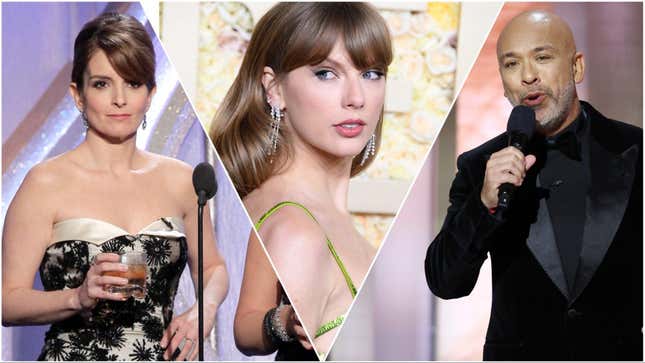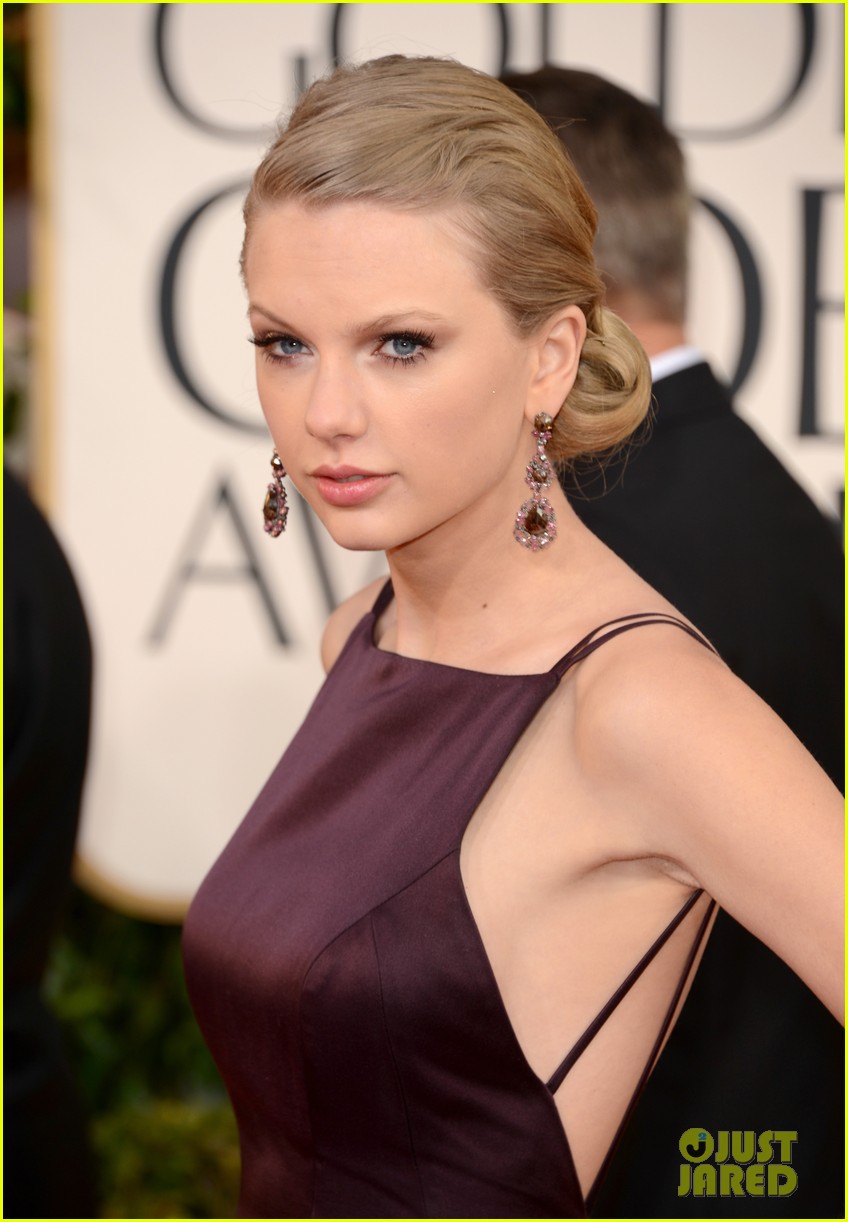This year’s Golden Globes wasn’t the first Taylor Swift awards show joke to have far-reaching consequences

Tina Fey; Taylor Swift; Jo Koy
Photo: Paul Drinkwater; Steve Granitz/FilmMagic; Rich Polk (Getty Images)
Sometimes an awards show moment can change the course of history—at least, if you’re Taylor Swift. The mind immediately goes to the 2009 VMAs, an event that has haunted both Swift and Kanye West’s careers for more than a decade. Most recently, there was the cringeworthy Jo Koy quip about the cameras cutting less frequently to Swift at the Golden Globes than they do at NFL games; Swift’s blank-faced reaction as she sipped a glass of wine showed how little tolerance she has for being an awards show punchline.

She’s been here before, literally, at the Golden Globes in 2013, when a joke from Tina Fey altered the course of Swift’s public persona, a joke that in some ways looms just as large over Swiftian lore as the infamous Kanye West interruption.
In January 2013, Swift was a few months fresh off the Red album and a public breakup with Conor Kennedy. She was in the audience as a nominee for the song “Safe & Sound” from The Hunger Games soundtrack when co-host Tina Fey, drink in hand, joked that the singer needed to “stay away from Michael J. Fox’s son.” (Sam Michael Fox was the evening’s “Mr. Golden Globe,” in charge of directing the attendees on the stage and handing over the trophies.) Her co-host Amy Poehler suggested Swift “go for it,” but Fey contradicted, “No, she needs some me-time to learn about herself.”

The passing joke seems almost quaint today, but at the time it was the straw that broke the camel’s back after an endless narrative surrounding the pop star that she was a serial dater. Swift suffered through it at the ceremony, but she fired back in an interview with Vanity Fair months later: “You know, Katie Couric is one of my favorite people. Because she said to me she had heard a quote that she loved, that said, ‘There’s a special place in hell for women who don’t help other women.’”
This quote (actually attributed to Madeline Albright) was notable not just for being a scathing (and perhaps a little clunky) response to what Fey would later describe as a “lighthearted joke,” but also because it marked a shift in Swift’s entire PR strategy. The year prior, Swift had declined to label herself a feminist, telling The Daily Beast, “I don’t really think about things as guys versus girls. I never have.” Now, in the wake of her awards show humiliation, she was flirting with Feminism 101.
By the next year, Swift was outright declaring herself a feminist and eschewing romantic relationships with men to surround herself with a “squad” of platonic girlfriends. These were deliberate choices meant to reframe her public image, Swift would later reveal. “I assumed I could fix this if I simply changed my behavior. I swore off dating and decided to focus only on myself, my music, my growth, and my female friendships. If I only hung out with my female friends, people couldn’t sensationalize or sexualize that—right?” She wrote in the prologue to 2023’s 1989 (Taylor’s Version).

A lot of ink has already been spilled about the way Swift will co-opt a political stance when it benefits her and drop it when it doesn’t. (Including by Swift herself: “I never had the courage of my convictions as long as danger is near,” she admits in her song “peace.”) Calling out Fey’s joke might’ve been the first time Swift called out misogyny directed at her, but it’s a tactic she would return to again and again in the years that followed—so long as the misogyny was related to her incredibly specific experience. (See: her complaints about the Netflix series Ginny & Georgia.) For what it’s worth, the incident seemed to haunt Fey as well. At the 2014 Golden Globes, she quipped that there was a “special place in hell” for Poehler after the latter won an award; the line pointedly came up again in an episode of Unbreakable Kimmy Schmidt years later.
Tina Fey tells Amy Poehler that she has a “special place in hell” – Golden Globe Awards 2014
Fey was hardly the only person to make such a joke at Swift’s expense, so it might not be strictly accurate to say that her Globes quip is directly responsible for Swift embracing feminism and the entire public persona of the 1989 era. But that moment and her reaction to it is a clear inflection point for Swift.
The feeling of being singled out in such a way in a room full of ultra-famous peers is one that looms not just over her PR strategy but in her actual art: “The jokes weren’t funny, I took the money/My friends from home don’t know what to say,” she sings on the 2022 track “You’re On Your Own, Kid.”

Here’s the thing: no one’s making a joke about you at an awards show if you aren’t famous enough to be worth talking about. Swift has been super-famous for more than half her life, but if her unamused reaction to Jo Koy’s attempt at humor is anything to go by, being used as a punchline is still something of a sensitivity for her. This hits at the dysphoria at the heart of her career, wherein she’s positioned herself as an underdog and an outsider, the girl who got bullied growing up and had no friends.
Today, she’s possibly the most famous woman on the entire planet; it’s why they make jokes about her, which makes the most famous woman in the world feel otherized, and on and on, ad infinitum. It’s no doubt a tedious cycle for Swift to be stuck in, and yet it’s also been an engine for her reinvention. It’s a singular characteristic of Swift’s career that these awards show moments are so deeply connected to her evolution.





